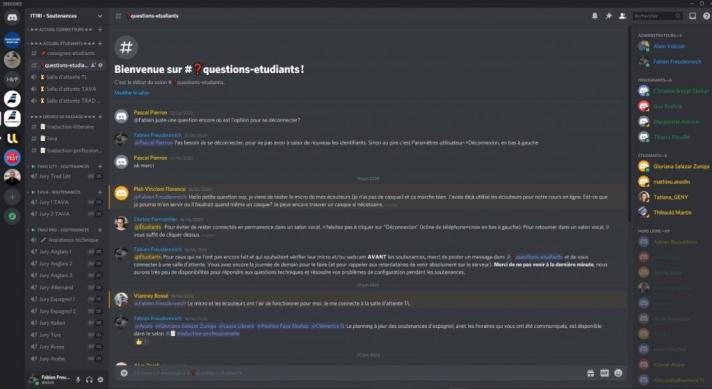
What with remote/on-site working (respectively: distanciel and présentiel in French) and other hybrid forms, France has by no means stained its neologistic reputation. Thus, it has been incredibly inventive in describing an educational reality, which unfortunately has not spared any training centre, amid this gloomy pandemic period. These new words may torment academics and flatter the egos of high dignitaries in didactics, considering they are sometimes (at best?) indicators of French cultural exceptions but often also symbols of linguistic lockdown. However, they have forced us to bow down, give up on our dreams of human proximity and break the chain of close contact with our students. After a masked debut, as classroom Zorros, we had to dress up as phantoms to haunt the broadband of online sharing applications.
Fortunately, after numerous Cornelian hesitations, specified in the following article, at ITIRI (Strasbourg), we opted for the platform Discord, which bears an ill-suited name. Far from being an apple of discord, this is a highly federating tool that can recreate teaching conditions, which are actually quite close to face-to-face lessons.
This is of course where the question lies. Along with the forced distancing from our temples of knowledge, imposed on both students and lecturers, comes the isolation as such, the coldness of the screen that we switch on and off, and the sadness of a faulty connection that leads to an abyssal void, which would normally have been filled by the comforting words of students and colleagues at the end of a lesson. The expression social distancing, so often criticised for its inappropriateness, is actually very suitable in this case. Physical distancing de facto leads to social distancing, to separation from others, like a circuit breaker that has tripped. In the student world, this is highly obvious and extremely dangerous.
Following the ITIRI Admissions and ITIRI Viva servers, we set up the ITIRI Remote Working server, which in its own way and to a certain extent, bridges the gap imposed by the virus. First and foremost, only a single manipulation is required to register and connect to this tailor-made world. The zealous administrators and guarantors of the students’ wellbeing, did not object to configure and personalise a tool that is reminiscent of the reassuring atmosphere of the building we are already familiar with. Therefore, in a preliminary phase, a considerable amount of thought and imagination was required, which was indeed constraining and time-consuming, but it provides a very user‑friendly atmosphere and a wide range of contact possibilities: public, private, discreet, personal, in small groups, international, punctual, sustainable, etc. Thus, we have designed personalised voice rooms for our office hours and for private conversations with our Italian, Greek, Turkish and Albanian institutional partners. We have also designed rooms for our students, so that they can privately meet at any time, work on a project, have a conversation about a lesson or just have an aperiscord by switching on their webcams. We have created rooms for all our lessons, bearing the names of our lecturers and subject titles, a room for publishing contest photos: ugly Christmas jumper, and rooms for academic administrators and technical assistance. Inside all of these virtual places, which are tailor‑made on the basis of an attributed role, everyone can come and go as they please, switch on/off, complain, laugh and cry, according to their moods, lessons and needs, either in groups or face‑to‑face. It is a unique place, set up ad hoc,to meet the specific requirements, previously analysed, which correspond to the expectations of the students that we know and cherish.
Seemingly, the real difference between Discord and other platforms is the possibility of being on an ‘island’, altogether in the same isolated place, in a close-knit community, with a sense of protection and guidance for students, along with a cohesive setting and a corporate spirit for lecturers and tutors. This is all to be found on a single platform, without having to send out specific invitations for each lesson or for each occasion in general. We are rather proud of this unifying tool that we have collectively designed with a real sense of communion.
Organisation of remote admission and viva sessions amid lockdown: the ITIRI example
By Fabien Freudenreich, Associate Lecturer - Institute of Translators, Interpreters and International Relations of the University of Strasbourg and Freelance Translator
The imposed closure of schools and universities in March, due to the coronavirus pandemic was unexpected for both the students and the teaching and administrative staff.
Initially, some reorganisation was necessary to resume teaching and everyone either chaotically rushed into different available options or adopted those they were already accustomed to and could properly handle. For instance, it is worth mentioning the free solutions offered by Framasoft, whose infrastructure quickly suffered from the influx of users, along with the different ‘homemade’ solutions proposed by universities, failing to meet all requirements, or even the more professional solutions like Teams or Zoom, meeting specific requirements but bypassing the supervision of the Directorate of Digital Services.
Beyond ongoing education, a decision had to be taken as regards admission sessions. Should they simply have been cancelled, following the example of other universities, that prioritised application form reviews, or have been maintained remotely, by finding a solution that meets our testing requirements?
Renouncing to these tests by selecting students on the basis of their application forms would certainly have been the easiest option in terms of logistics, but it would have increased the risk of miscasting. Once discussed, we decided the admission tests, with a few modifications and an adapted solution for the written part, would be maintained.
Requirements:
Although it is quite feasible to organise timed written tests on a remote basis, the organisation of remote oral tests is more complex.
A solution was required to reproduce our usual oral testing procedures, as well as our logistics.
For the candidates: respecting the notification time, receiving a topic to prepare, preparing and presenting before the interview panel (compulsory use of audio and video if possible).
For the lecturers and the interview panels: simultaneous running of several interview panels, submitting the topic to be prepared, deliberating between interviews, and reviewing the candidates’ application forms.
Although some courses use Skype and Zoom, and the University proposes BigBlueButton, a tool with the same organisation principle for virtual meetings, these solutions failed to deal with a crucial aspect of our admission sessions: the management of the simultaneity of interview panels. We wanted to ensure that the numerous candidates as well as the members of the interview panels, would not have to juggle between several options. The context was already exceptional enough, so we wanted to guarantee that the candidates’ experience would be as smooth as possible, while maintaining an overarching view over the simultaneous running of the interview panels.
In order to deal with these aspects more easily and try to loyally reproduce the physical organisation of our admission tests, we opted for Discord.
What is Discord?
Discord is a free tool, released in 2015, initially designed for gamers, to create video game communities. Today, there are many private and public communities that are interested in a variety of themes: video games, manga, cinema, politics, cooking, wellbeing, etc. Discord offers several advantages. Not only is it a free and user-friendly tool, it is also known by many students whether they are gamers or not.
Each user can create a server, add chat or voice rooms, and invite others. Although Discord was initially invented to meet gamers’ requirements, the publisher’s site has recently been redesigned to expand its audience, highlight a sense of cohesion and community amid the pandemic period, and follow the trend of other collaborative tools like Slack or Teams, which are widely used by remote workers.
The functioning of Discord:
Similar to Slack, Discord runs on the principle of communication within channels, or rooms, which allows sharing text messages, with attachments, and communicating using audio or video options. Discord can be used as a downloadable application for a mobile device, or it can be used directly in a browser. An administrator of a server can control the users by giving them roles, with specific rights (i.e. the authorisation to connect to different rooms, use the video or communicate in rooms, etc.).
Organisation of the admissions server:
The server offers several categories, for administrators, lecturers or candidates, with rooms containing information on its functioning, the configuration of a headset, the running of tests and the different operations to conduct. It also contains voice rooms, used by the interview panels for the different languages on offer. We have also designed a PDF guide for candidates and members of the interview panels. Five roles are used: administrator, candidate, lecturer, academic administrator and ‘everyone’, which is the basic role available on each server. Users who connect to the server for the first time automatically take on the ‘everyone’ role, with limited rights, and are then given an adequate role corresponding to their function.
Running of oral tests:
Usually, the face-to-face oral tests are conducted as follows: the candidate arrives at the notification time, in front of the designated interview panel room. A member of the panel welcomes the candidate who is given a text to prepare in a specific room, for twenty minutes. Then, a member of the panel fetches the candidate, and the oral test starts in the interview panel room. Once the oral test is over, the candidate leaves, and the panel deliberates. During the oral test, it has access to a paper version of the candidate’s application form. If candidates present another language, they proceed to the respective interview panel room, at the notification time, and the same process applies.
For the oral tests on Discord, the following logistics have been implemented: the candidate enters the Waiting Room (to reproduce the physical corridor of ITIRI), at the notification time. For each interview panel, a member moves each candidate into the interview voice room, the candidate is then welcomed and undergoes an identity check. The interview panel submits the topic to be prepared, to the candidate, by sending a direct message with an attachment containing the text. The candidate is then sent back to the Waiting Room to prepare the text. There, candidates can neither communicate using their voices nor their webcams, in order to reduce the risk of cheating. Before the beginning of the test, the candidate is moved back to the interview panel room, and the oral test begins. Once the interview is over, candidates can disconnect from the server, if they have finished, or can return to the Waiting Room if they are presenting another language. The members of the interview panel deliberate vocally. During the interview, the panel has access to the candidate’s application form via eCandidat.
Similar to the different oral tests that take place at the same time in different rooms in the event of face-to-face admission sessions, the interviews simultaneously took place in different voice rooms, according to an initially established schedule, and the candidates were moved about by the respective interview panels.
Technical constraints:
Although, the oral admission sessions were successful overall, we obviously had to cope with several technical problems, such as connection failures, microphone/webcam hitches, compatibility issues with certain browsers, or issues relative to the management of rights, concerning both the candidates and the members of the interview panels. In order to reduce the risks to a minimum, we ran trial sessions, both for the candidates and the members of the interview panels.
We always managed to find a solution. Although the conditions were not always ideal, we managed to interview around 200 candidates and formed a precise opinion on each one, in a satisfactory manner. This would not have been the case for a selection process solely based on the candidates’ application forms.
Reproducing this success:
After the admission sessions, we organised final deliberations in a specific voice room and communicated the results to the candidates on the same server, before sending out the official results by email.
Considering the oral tests were satisfactorily conducted, we also decided to organise viva voce examinations via Discord. In this respect, we created a distinct server, which functions in a relatively similar fashion, with a few modifications according to requirements, such as distinct waiting rooms for the three degree programmes, or different voice rooms for each course.
The examinations were also properly carried out and we managed to optimise a few procedures, by learning from the admission sessions.
The issue of personal data:
This question should obviously be raised, since we are organising official educational activities, using an unrecommended tool, which bypasses the supervision of the Directorate of Digital Services (the servers are hosted by Discord datacentres all over the world). Although Discord automatically collects a certain amount of data, as is the case for many tools and a lot of software, the publisher’s confidentiality policy indicates that collected data is not resold. This statement is obviously difficult to check, but options are nonetheless available in the user settings, in order to reduce the sent data. To maximally reduce the risks on the servers that we have created, we have specifically asked users not to share files containing sensitive information, and to use official channels instead. For instance, the candidates’ application forms were to be strictly reviewed on eCandidat, and not to be shared via Discord.
The constraining aspect has still to be addressed. Although the vast majority of students already use Facebook and other social networks by their own accord, it is difficult to force candidates or students to use a specifically owned platform without giving them the choice. The same question can also be raised for Zoom or other tools used by certain courses. However, we had to take important decisions quickly, in the absence of relevant alternatives proposed by the University or the Ministry. These choices turned out to be successful given the obtained results, amid a difficult context, over which we had no control.
What’s next?
Several other courses in France used Discord amid lockdown, to develop a sense of educational community and maintain a crucial bond with students, who were scattered and locked down all over France, or even all over the world. For instance, the Information-Communication course of the University of Lorraine, used and still uses a Discord server that unites students and lecturers, so they can share useful information, both during lockdown and for the return to university.
The community aspect of this communication tool would be interesting to develop for ITIRI. The point is not to turn Discord into the official communication tool of the institute, but to allow students from different Masters and specialisations to communicate, share, work together and evolve within a close-knit community, even if it is a virtual one. Not only is a community management platform generally useful to reinforce the links between the students and the teaching staff, it is also crucial amid a crisis, like the one we are going through just now. However, this kind of appliance raises other questions, notably in terms of confidentiality, security and content moderation, that require an in‑depth analysis.
Details
- Publication date
- 5 January 2021
- Language
- English
- French
- Dutch
- EMT Category
- Pedagogical initiatives



